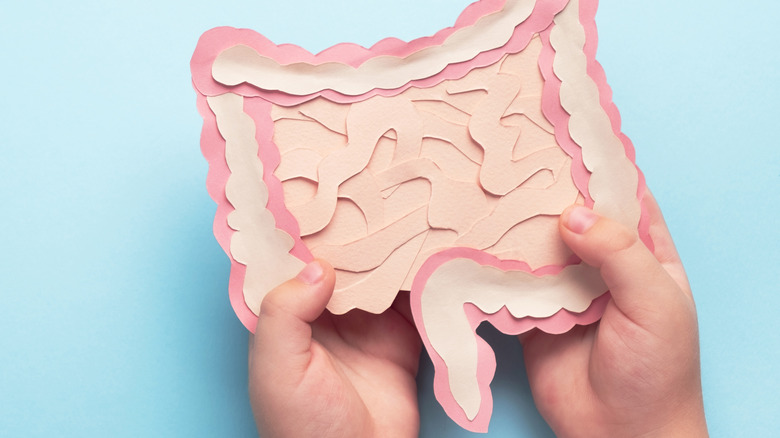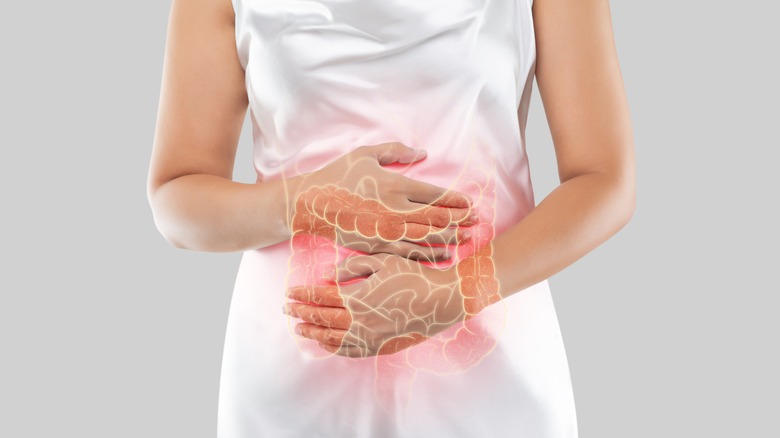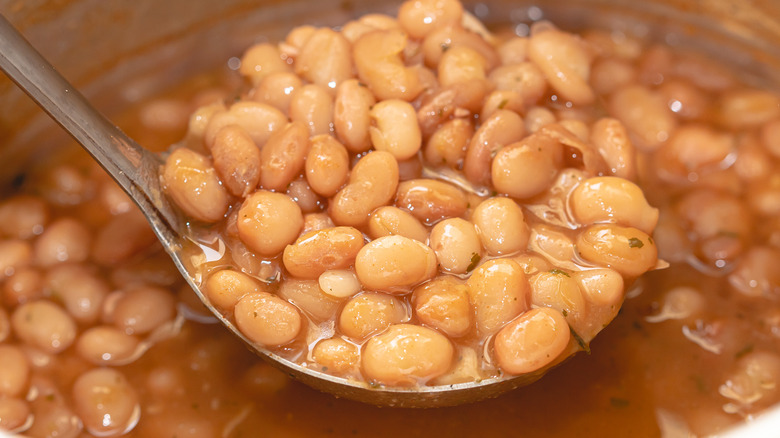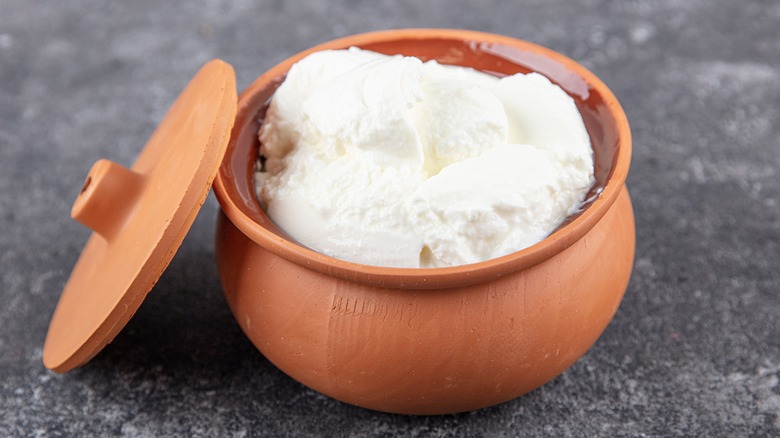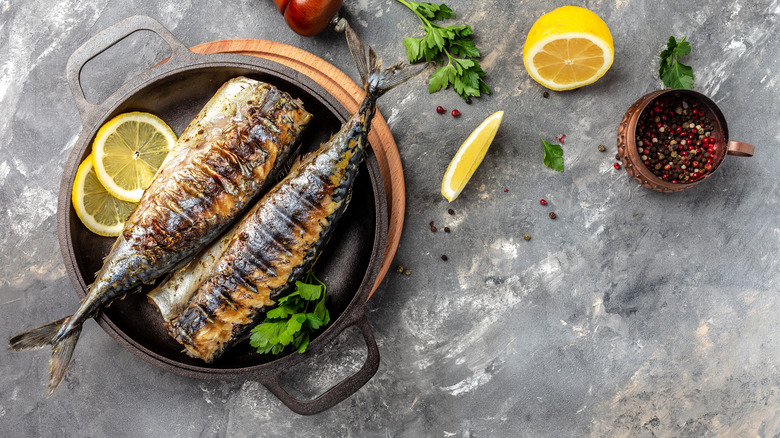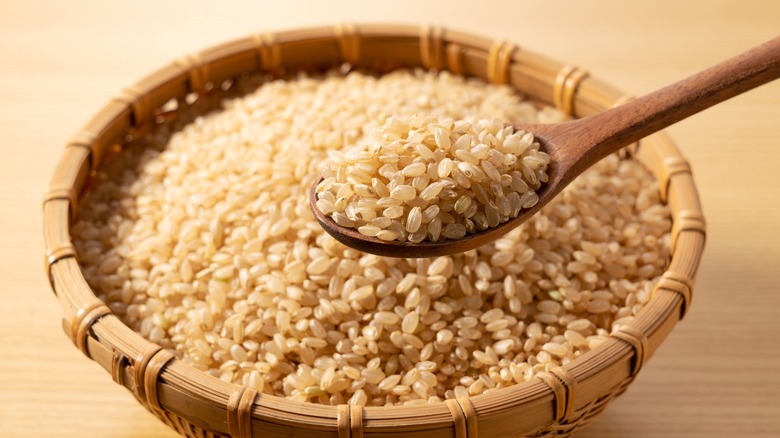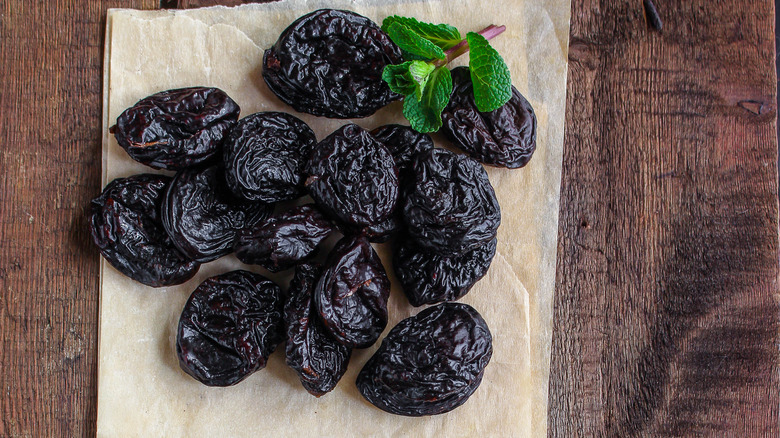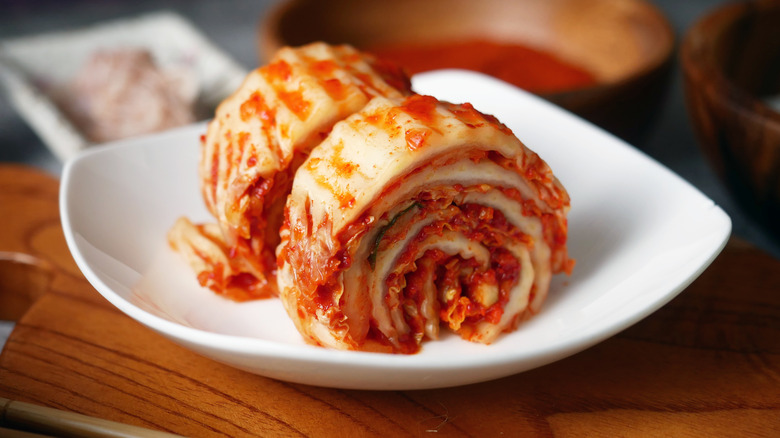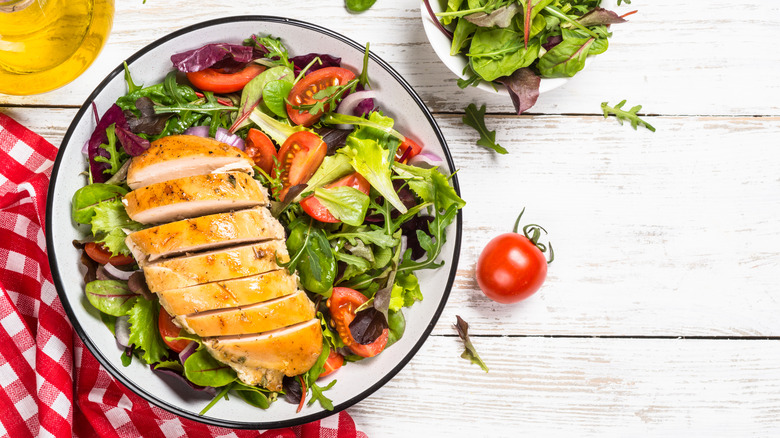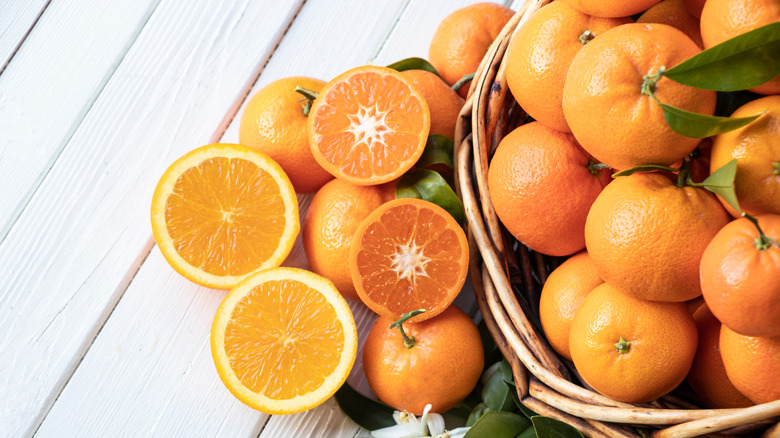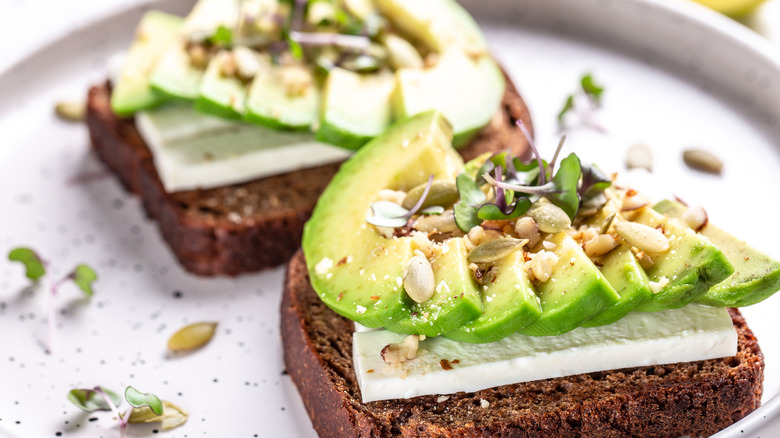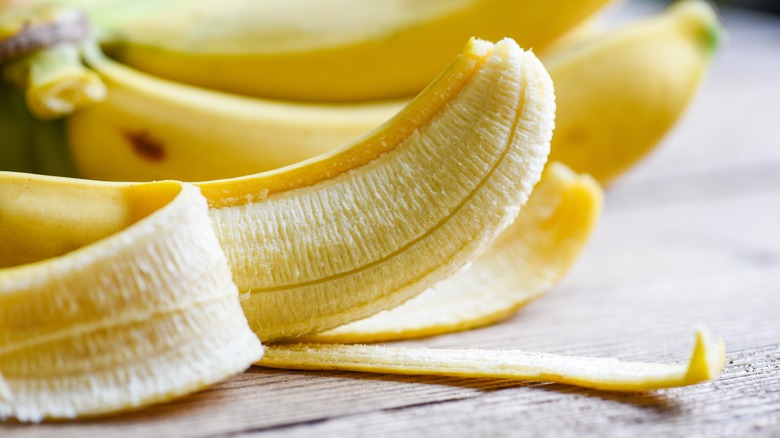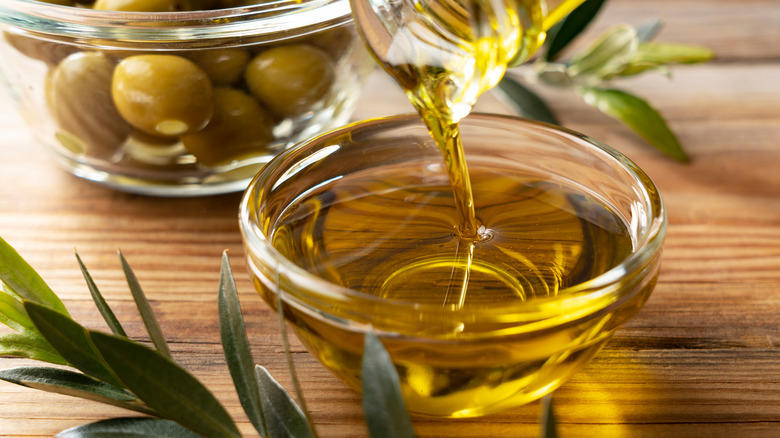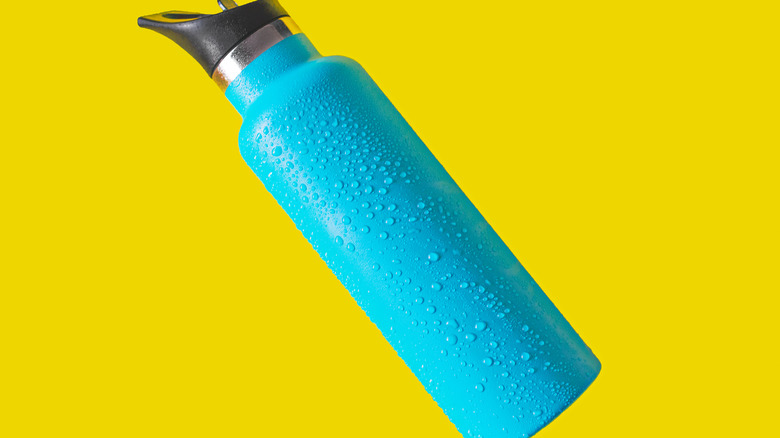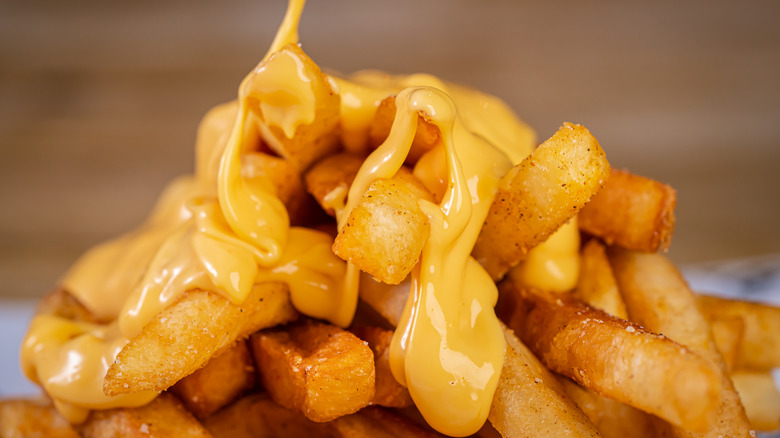12 Foods To Eat For A Healthier Colon
We're willing to bet that pretty much everyone wants a healthier colon. Okay, sure, it may not be at the top of most people's priorities list when it comes to their bodies (bulging biceps and toned legs, we'd imagine, are a little more glamorous to work toward), but trust us when we say that whether you're aware of it or not, your colon health is something you should consider. The colon, part of the large intestine, plays an enormous part in your overall gut health, continuing your digestion from your stomach and small intestine and moving your stool through to the other side (i.e., the toilet bowl).
But it can be susceptible to a wide range of health concerns and conditions, with everything from constipation to excess gas, irritable bowel syndrome (IBS), and diverticulitis manifesting in the large intestine and creating issues. And one of the most serious colon conditions, colon cancer, affects more than 100,000 new people every year, according to the American Cancer Society. It's for these reasons that it's vital that we treat our colon well, and what we eat can have a huge bearing on how well our large intestine functions. In this list, we'll show you all the foods you need to have on your plate.
How do I know if my colon health is bad?
The colon and its health is intimately related to the health of your overall digestive system, so looking out for signs that your gut health isn't top-notch is a good place to start. Oftentimes, health issues will manifest in the form of digestive problems like constipation, diarrhea, excess gas or bloating, or IBS, says Piedmont. Some signs of bad gut health can also appear outside your digestive system, with fatigue and weakness or weight changes sometimes indicating issues. "When I hear people mention these symptoms, I'll ask about their diet and the quality of the foods they are eating. If there is no other medical cause, their symptoms could be related to an unhealthy gut," states family medicine physician Diondra Atoyebi to Piedmont.
These symptoms can also be an indicator of colon cancer, in addition to symptoms such as bloody stools, changes in stool consistency, and a feeling of not quite being "finished" when you've been to the bathroom, as the Mayo Clinic points out. It's important to bear in mind, though, that colon cancer may be symptomless in its earlier stages. If you see any of these symptoms and you're concerned about your colon health, contact your doctor immediately.
Pinto beans
Most people are aware of the link between eating beans and subsequently having a gassy gut (via Healthline). But don't be put off by this, as beans are one of the best things you can eat if you want to take care of your colon. Beans are naturally super-high in fiber, a vital nutrient for colon health, as the Mayo Clinic discusses. When we eat sufficient amounts of fiber, our stools become a healthy weight, shape, and consistency, and can move through our colon with ease. This means less constipation, a lower chance of diverticular disease and hemorrhoids, and even a potentially smaller chance of developing colorectal cancer.
And when it comes to the fiber content in beans, it's hard to go wrong with the humble pinto. One cup of pinto beans contains over 15 grams of fiber, as Healthline notes, which is more than half of the recommended daily intake for women under 50, and just shy of half the amount needed daily for men under the same age. If pinto beans aren't your thing (which we wouldn't get, because they're delicious, but to each their own), kidney beans, black beans, chickpeas, and lentils also provide an ample amount of fiber per serving, with haricot beans delivering even more fiber per cup — over 19 grams.
Yogurt
If you haven't got a carton of yogurt in your fridge, we'd really recommend you grab one ASAP, folks. Aside from the fact that yogurt is versatile and tasty, it's pretty much a wonder food: This creamy, sour treat contains at least a portion of pretty much all the nutrients your body needs, and can promote better heart health and better immunity, among other things (per Healthline). And your colon will thank you for eating yogurt, too.
Dairy products such as yogurt may be incredible for supporting your colorectal health, thanks to their calcium content, which may limit the incidence of cancer and the growth of benign adenoma tumors (per WebMD). Yogurt, specifically, could be beneficial here. A study published in The American Journal of Clinical Nutrition examined the link between eating yogurt and the chances of developing colorectal cancer and found that the more yogurt people ate regularly over a long period, the less likely they were to have the condition. As the study discusses, this could not just be due to yogurt's calcium content, but also to the fact that it's fermented and therefore contains good bacteria that boost your gut microbiome and digestive health.
Mackerel
When it comes to oily fish, salmon tends to occupy the throne in the health stakes. But spare a thought for the mackerel. These underrated, tasty fish are absolutely jam-packed with nutrients, with an abundance of minerals and vitamins that aid your body in a variety of functions (per WebMD). And that's before you consider their omega-3 fatty acid content, which not only rivals other seafood sources, but could keep your colon very happy. As a meta-analysis published in the journal Cancers shows, regularly consuming fish (including fatty fish like mackerel) as part of a balanced diet is associated with a lower overall risk of colorectal cancer.
It's worth bearing in mind that not all studies are uniform in their findings around omega-3 fatty acids and colorectal cancer. One study, published in JAMA Oncology, found that adding an omega-3 supplement to an already healthy diet did not appear to reduce the chances of developing precursors to colorectal cancer. Nonetheless, it's always a pretty good idea to try and boost your omega-3 intake thanks to their benefits to a range of other considerations, like brain and heart health (per the Harvard T.H. Chan School of Public Health).
Brown rice
It's a sad fact of life that not all carbs are created equal. But if you're looking for a premium carb to add to your plate, it's hard to go wrong with brown rice, not least thanks to its potential benefits to your colon health. Brown rice, along with other whole grains, can promote colorectal health and reduce your risk of developing colorectal cancer, according to the Roswell Park Comprehensive Cancer Center. Indeed, a study published in the British Journal of Cancer found that when people consumed multiple servings of whole grains per day, they had around a 35% lower colorectal cancer risk.
Why is this the case? Researchers point toward a host of reasons why whole grains could be so good for your colon, including their higher vitamin and mineral levels, as well as their content of phytoestrogens — naturally occurring plant compounds present in grains that may assist in lowering colorectal cancer (per Healthline). There's also, naturally, their fiber content to consider, with whole grains generally delivering far higher levels of fiber than refined grains, leading to overall better gut health (via the Roswell Park Comprehensive Cancer Center). The best part is, it's super simple to include more whole grains in your diet, by simply swapping out refined carb options like white bread or pasta for whole-grain versions.
Prunes
Anyone who's ever absentmindedly eaten a few too many prunes and then found themselves sitting hunched over a toilet bowl pretty soon after will attest to their powerful ability to get your colon moving (via Kitchn). But trust us when we say that this quality is good news for your gut, provided that you're eating them in moderate quantities. Prunes are especially abundant in fiber, which is instrumental in keeping the gut and colon healthy, as registered nutritionist Nicola Shubrook points out via BBC Good Food. But they're also rich in phytonutrients and sorbitol, both of which work to move food through your system and keep your bowel emptying while also delivering the food for the friendly bacteria that live there.
Bear in mind, though, that it's entirely possible to have too much of a good thing. While prunes can serve as an efficient natural laxative and can be super-helpful for people with constipation, eating too many may loosen your stools too much, resulting in diarrhea (per WebMD). This can also happen when eating other sorbitol- and fiber-rich dried fruits, like figs.
Kimchi
Have you got a jar of kimchi in your fridge? You haven't, you say? We're clearly gonna have to do some convincing here, folks. If you're looking for a food that'll be your colon's best friend, kimchi and other fermented foods are your first port of call. These foods, which also include sauerkraut, tempeh, kefir, and yogurt, are not only rich in fiber but have a probiotic effect, which allows your gut microbiome to flourish, says Rush University. This community of healthy bacteria helps our bodies digest food more effectively, breaking down what we eat so that we can process it through our system smoothly and easily, while also making the nutrients in the food more available to our bodies (per Medical News Today). What's not to love?
Now, it's not just one or two foods that you need to be eating to keep your gut microbiome healthy — the best approach is following a healthy, varied diet overall. "A plant-based or Mediterranean-style eating pattern has been shown to diversify the gut microbiota as well as reduce the risk of developing colorectal cancer," states Rush University Medical Center clinical dietitian and registered dietitian nutritionist Kaitlyn Eisenberg. That said, your gut microbiome will definitely thank you for incorporating some probiotic goodness from kimchi.
Chicken breasts
Protein can be a difficult nutrient to get exactly right. While we must get enough of it, it's also the case that a lot of proteins out there also come with a host of other nutritional factors that we need to consider. Oftentimes, protein sources like red meat contain higher amounts of fat, which can prove troublesome to the colon — this is because fat causes it to contract and create irregular bowel movements, especially for folks who already have conditions like IBS that affect their bowel (per Johns Hopkins Medicine). Eating red meat may also lead to the production of harmful colon bacteria that can affect other parts of your body.
But other protein sources could prove way more beneficial to your colon, and the simple chicken breast is one of them. A study published in the American Journal of Gastroenterology examined the effects of eating different proteins on colon health and found that when people ate more chicken and white meat, they were less likely to develop colorectal adenomas, an early indicator of colorectal cancer. Individuals who ate more processed meats in their diets, on the other hand, appeared more likely to have adenomas form (per Science Daily).
Oranges
There's nothing like a good orange. Juicy, sweet with a hint of tartness underneath, and endlessly refreshing. But there's far more to love about oranges than just their taste, and their potential benefits to colon health could be one of them. Vibrant fruits like oranges are packed with naturally occurring compounds called phytochemicals, which can have an anti-inflammatory effect on the body, according to WebMD. This could benefit your colon health, as well as your overall health.
As well as this, oranges and other fruits are really good at getting things moving. As research published in Food & Function shows, eating fruits could have a positive impact on gut motility, potentially thanks to their fiber and sorbitol content. As well as these perks to your colon and gut health, fruits like oranges are also packed with essential vitamins that contribute to better health overall, which is partly why it's recommended that you eat a wide variety of fruits and vegetables. Aiming to "eat the rainbow" with a range of brightly colored vegetables and fruits every day can help you keep your diet and nutrient intake diverse (per the British Heart Foundation).
Seeds
Seeds can provide a nutritional punch to our meals and snack times (as well as great flavor), but they've had a bad rep in the past for their potential effects on the gut. Once upon a time, seeds were thought to contribute to the development of diverticulitis, a condition that's caused by the infection of pouches in the colon called diverticula (per Harvard Health Publishing). It was reasoned that seeds could get lodged in the diverticula, thereby leading to infection.
However, we are pleased to announce that is not the case, and in fact, seeds such as chia, flaxseed, hemp seeds, sunflower seeds, and pumpkin seeds could be a worthwhile addition to your diet for your colon health. They all contain fiber, an essential component to keep your food moving through your system and your colon healthy. Not only that, seeds are also well-stocked vaults of nutrition, providing protein and healthy fats, states Brigham and Women's Hospital Department of Nutrition director and registered dietitian Kathy McManus to Harvard Health Publishing. Alongside seeds, adding nuts to your diet could also provide a similar benefit to your colon health and your overall dietary quality, thanks to their fiber content and an abundance of healthy fats, vitamins, and minerals.
Bananas
It's honestly pretty hard to go wrong with a banana, friends. The ubiquitous yellow fruit is not just a firm favorite in everything from cereals to sandwiches, but it's also a nutritional dynamo, and could help everything from your heart to your blood sugar (per Healthline). And while bananas are well-known for their potassium levels, there's one other mineral residing in them that makes them especially beneficial for your colon: magnesium.
Magnesium can be especially good for your digestive health thanks to its ability to reduce constipation and encourage stool movement, as Michigan Medicine discusses. The mineral works to bring more water into your intestines, which then helps to ease the passage of your stools through your system, preventing them from becoming dry and creating constipation. This can all have a powerful bearing on colon health, with one study published in JAMA outlining the potential effectiveness of magnesium in lowering the risk of colorectal cancer. And luckily, bananas are packed with the stuff, with one regular banana providing almost 10% of your recommended daily intake of the mineral (per Healthline). As an added bonus, bananas are also packed full of fiber, which'll benefit your gut and colon health even further.
Olive oil
We don't think we'll ever stop singing the praises of olive oil, and not just because it tastes so, so, so good. With its super-healthy fat, phytochemical, and antioxidant content benefitting a range of things in your body, this is one oil you're going to want to have on your table (per WebMD).
But while we don't often associate olive oil with gut and colon health, it turns out that it could be a powerful ally there too. Consuming some of the oil daily could act as a softener for the passage of your stool, by working to line your bowel to make your poop move through easier, and to keep water inside it to stop your feces from drying out (per Medical News Today). It's thought that consuming olive oil first thing in the morning, before you've eaten anything else, would have the most effect on constipation. Importantly, though, you shouldn't consume more than this on an empty stomach, as it might just create more digestive issues like cramping or diarrhea. It's also vital not to view olive oil as a constipation cure in itself — primarily, you should focus on an overall healthy diet, including ample fiber.
Water
A varied, healthy diet full of fiber and gut-friendly foods is vital for maintaining a healthy colon. But at the end of the day, unless you're drinking enough water, it'll all be for nothing. When it comes to keeping your stools healthy, perhaps nothing is more important than good hydration. When we don't have enough water in our system, the food we eat can become seriously dried out as our intestines suck the moisture out (per WebMD). This then makes our poop harder, and our intestines constipated, which can lead to a range of other issues.
Water also helps to maintain our intestinal health, and the general health of our bodies. In short, you really need to keep drinking it, folks. Aim for around eight cups of water per day as a general baseline, with additional fluids needed if you're sweating a lot and/or performing exercise. Aside from water, other fluids like herbal teas or juices can provide hydration — but remember that not all liquids are created equal. Alcoholic drinks, for instance, may actually dehydrate you by causing you to pee more.
What foods should I avoid for a healthier colon?
There are plenty of foods out there that will have your colon feeling pretty happy, but there are also some dietary choices that are less beneficial for your large intestine. If you're trying to eat for colon health, it's advisable to limit your red and processed meat intake. Both red and processed meats have been observed to be detrimental to colon health, and could increase your risk of developing colorectal or stomach cancer, as WebMD points out. Drinking bigger amounts of alcohol can also have a negative impact on your colon, with regular heavy drinking corresponding to a higher cancer risk.
It also might be worth trying to watch how much fried food you're eating. Foods fried in a large amount of unhealthy fats can make your gut and your colon feel pretty bad, with gas and diarrhea being some of the symptoms that can occur (per Medical News Today). Foods that are abundant in saturated or trans fats may also cause an imbalance of your gut bacteria, which may lead to digestive and colon issues.

